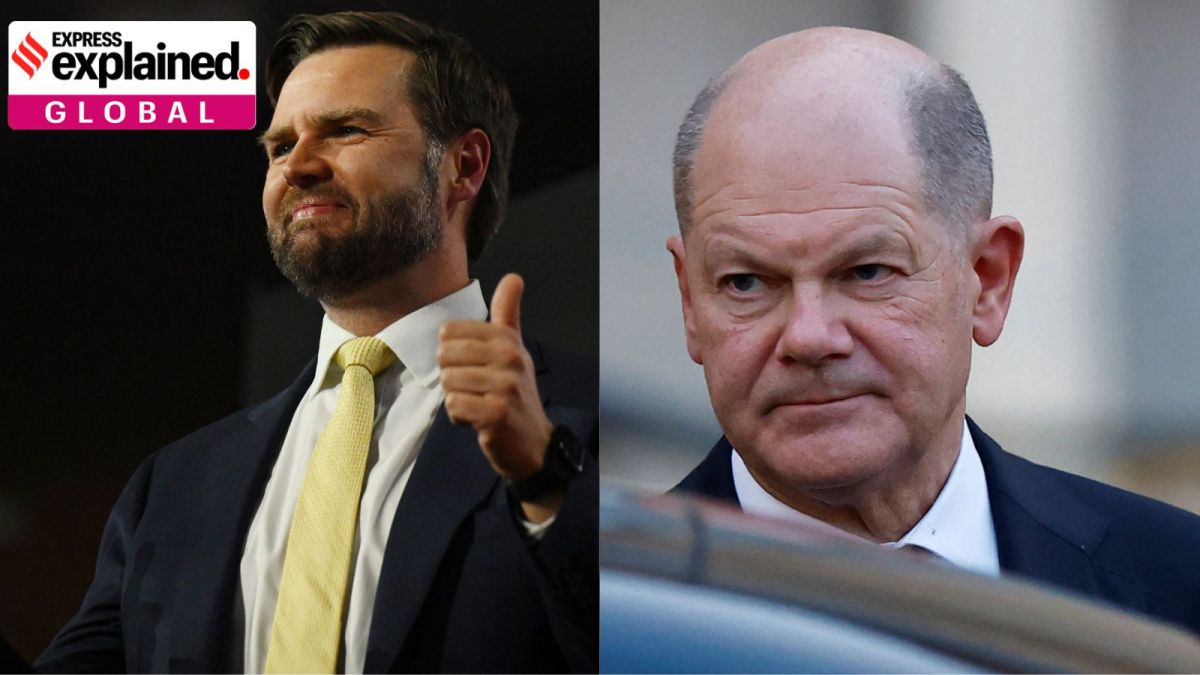US VP J D Vance attacks Germany over free expression: Laws that govern hate speech in the country
Germany is being criticised for its recent crackdown on online hate speech. While the country has defended its actions arguing that its strict hate speech laws aim to protect democracy, critics have claimed that they stifle free expression.

Speaking at the Munich Security Council, United States Vice President J D Vance last week accused European leaders of censoring free speech, and criticised German mainstream parties’ “firewall” against the far-right Alternative for Germany (AfD).
In response, German Chancellor Olaf Scholz said it was not right for others to tell Germany and Europe what to do.
Here is a look at major German laws that govern hate speech in the country.
Section 130
Section 130 of the Strafgesetzbuch (German criminal code) criminalises “incitement to hatred and insults that assault human dignity against people based on their racial, national, religious or ethnic background,” according to a report by PBS. It carries a punishment of up to five years.
Section 130 was first enacted in 1871 to prosecute class warfare as a response to the spread of Communism, Robert Kahn, a professor at the University of St Thomas School of Law who studies German hate-speech law, told PBS. However, after World War II, the law was amended to prosecute racist and antisemitic threats, and slurs.
In 1994, Section 130 was expanded to explicitly ban Holocaust denial, which is also punishable by a sentence of up to five years.
Chapter 14
This law also dates back to the 19th Century and punishes a “range of personal insults, from malicious gossip against private citizens to defamation against politicians,” the PBS report said.
One of the key elements of Chapter 14 is that it prohibits defiling the memory of the dead. This has been used to prosecute Holocaust deniers. Violators of the law can face fines or up to two years in jail.
Sections 86 and 86a
These provisions “ban the distribution of online and offline propaganda and the public display or distribution of “flags, insignia, uniforms, slogans and forms of greeting” belonging to political parties and organisations that have been deemed unconstitutional by the Federal Constitutional Court, such as Nazis and neo-Nazis,” the PBS report said.
Network Enforcement Act
Enacted in 2017, the Network Enforcement Act was designed to combat hate speech and fake news on social media. It required social media companies to take down posts pertaining to hate speech, terror threats, and child exploitation. Failure to do so would lead to a fine of up to 50 million euros.
The law was made more stringent a year after the 2019 murder of politician Walter Lübcke, who openly supported then Chancellor Angela Merkel’s progressive immigration policy. Speaking to CBS News, German prosecutor Svenja Meininghaus, said, “People with a very right political worldview, they started hating him on the internet. They started insulting him. They started to incite people to kill him.”
After Lübcke’s assassination, “the Network Enforcement Act toughened penalties for online insults and increased reporting requirements for social media companies,” the PBS report said.
Moreover, it allowes authorities to prosecute not only individuals who create or share hateful content but also those who engage by liking or reposting it.
Under the law, social media companies are also required to report the IP addresses of users posting neo-Nazi propaganda, threats of serious violence, etc.
Criticism
The Network Enforcement Act has repeatedly come under criticism from both left- and right-wing political parties in Germany, and human rights organisations. For instance, in 2017, David Kaye, who was the United Nations special rapporteur to the High Commissioner for Human Rights at the time, said in a statement, “The law raises serious concerns about freedom of expression and the right to privacy online… [It] could lead social networks to over-regulate expression — in particular, to delete legitimate expression, not susceptible to restriction under human rights law, as a precaution to avoid penalties.”
Others have defended the law saying that such laws are necessary to protect democracy. Josephine Ballon, CEO of HateAid, a Berlin-based human rights organization that supports the victims of online violence, told CBS News that free speech needs boundaries. “And in the case of Germany, these boundaries are part of our constitution… Without boundaries, a very small group of people can rely on endless freedom to say anything that they want, while everyone else is scared and intimidated.”